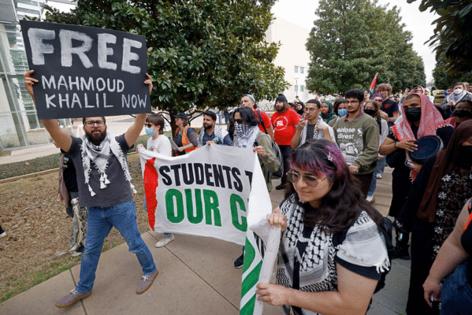What makes ICE protests 'illegal' in Texas? Here's what state and federal laws say
Published in News & Features
FORT WORTH, Texas — What makes a protest “illegal” and not covered by the First Amendment? And what should Texans know about their rights if they go to a “No Kings” anti-ICE protest — or any of the demonstrations across the state related to President Trump’s immigration policies?
The First Amendment of the Constitution guarantees key freedoms, including the right to peacefully assemble. This means you have the right to express your opinions openly, without government interference, as long as the assembly remains peaceful.
What are your rights to protest on public or private property?
Your rights are strongest in “traditional public forums,” like parks, sidewalks and streets, according to the American Civil Liberties Union. While you generally have the freedom to express yourself on other public land, like plazas outside government buildings, it’s important that your actions don’t block access or interfere with the building’s intended function.
On private property, the owner has the right to impose restrictions on speech. However, the government cannot limit your speech if you’re on your own property or have permission from the owner. It’s also important to remember that counter-protesters have the same rights to free expression, and police must treat both protesters and counter-protesters equally.
Is it legal to take photos or video protests, police or government buildings?
You are legally allowed to photograph anything in plain view, including government buildings and law enforcement officers, when you’re in a public area.
On private property, however, the property owner may have their own rules about photography or video recording.
What is an ‘illegal protest’?
Protesting is a fundamental right protected by the First Amendment, but not every demonstration is automatically legal. According to the Freedom Forum, a nonpartisan foundation dedicated to preserving the First Amendment, the following actions can cross the line and turn a peaceful protest into one that could get you arrested:
—Violence or destruction of property – If a protest turns violent, involves vandalism, or causes harm to people or property, it’s no longer protected under free speech laws.
—Trespassing on private property – Protests are generally allowed in public spaces, like sidewalks and parks. But if demonstrators enter private property without permission, they could face trespassing charges.
—Blocking roads or public services – Marching in the street without a permit or blocking traffic can make a protest illegal. Many cities require permits for demonstrations, especially those that could disrupt public order.
“It can’t be about the content of the speech, because content and viewpoint are protected by the First Amendment,” TCU media law professor and First Amendment expert Daxton “Chip” Stewart said. “It has to be about something else. A protest that blocks traffic, for example, or that arises to violence.”
Texas laws about protesting
According to the Texas Law Library, there are specific restrictions on where protests cannot take place.
For example, it’s illegal to protest within 1,000 feet of a funeral service from three hours before to three hours after the event, as this could disrupt the service. Likewise, protests at critical infrastructure sites, like oil pipelines or construction areas, are heavily regulated, with severe penalties for trespassing or disrupting these facilities.
Additionally, blocking highways, sidewalks or any passageways that are accessible to the public — especially emergency routes — is prohibited, and doing so can lead to felony charges.
Protests that turn disorderly or disrupt lawful meetings also fall under legal restrictions. Finally, any actions that involve violence or loud, disruptive noise are subject to criminal penalties.
What are your rights if you protest on college campus?
In 2019, Texas passed a law that made all common outdoor spaces on public university campuses “traditional public forums.”
This means that anyone — whether you’re a student, staff member, or just someone from the community — can express themselves, whether that’s through protests or other demonstrations, as long as it’s lawful and doesn’t seriously disrupt the university’s operations.
The law also allows universities to set some ground rules about when, where, and how these activities can take place, but those rules can’t favor one viewpoint over another. It also ensures that students and others on campus can hand out materials or gather without having to get permission from the university first.
Private universities, like TCU, may have additional guidelines in place for protests. For instance, the demonstration guidelines on TCU’s website state that protests shall not “disrupt University activities,” and all demonstrators must register the protest at least 48 business hours in advance.
Do you have a right to wear a mask in public at protests?
There are no Texas laws banning wearing masks in public, including at protests. There has been some discussion in the Texas Legislature to ban masks, especially after concerns about violent incidents linked to protests related to the Israel-Hamas war, but there are no laws in Texas forbidding them at protests.
“That (is a) protected activity. It’s expressive conduct, like wearing clothes, or (how) some peoples’ religion requires them to wear head or face coverings,” said Stewart, the TCU media law professor.
Still, it’s a good idea to check your university’s specific policy about masks at demonstrations, as wearing one could lead to consequences, depending on the school’s rules. For many, wearing a mask is a necessary medical consideration.
_____
©2025 Fort Worth Star-Telegram. Visit star-telegram.com. Distributed by Tribune Content Agency, LLC.







Comments